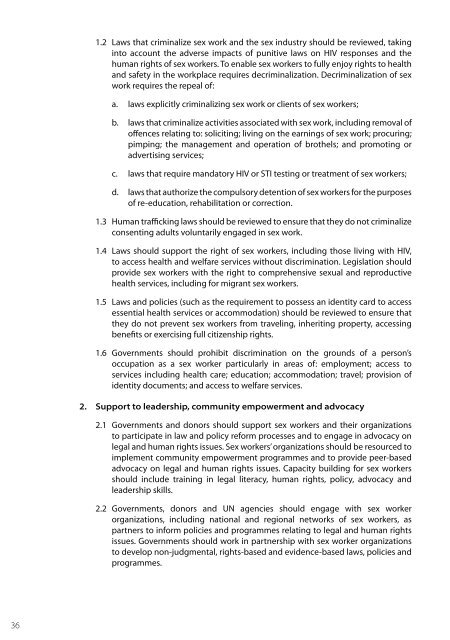SEX WORK AND THE LAW - HIV/AIDS Data Hub
SEX WORK AND THE LAW - HIV/AIDS Data Hub
SEX WORK AND THE LAW - HIV/AIDS Data Hub
You also want an ePaper? Increase the reach of your titles
YUMPU automatically turns print PDFs into web optimized ePapers that Google loves.
1.2 Laws that criminalize sex work and the sex industry should be reviewed, taking<br />
into account the adverse impacts of punitive laws on <strong>HIV</strong> responses and the<br />
human rights of sex workers. To enable sex workers to fully enjoy rights to health<br />
and safety in the workplace requires decriminalization. Decriminalization of sex<br />
work requires the repeal of:<br />
a. laws explicitly criminalizing sex work or clients of sex workers;<br />
b. laws that criminalize activities associated with sex work, including removal of<br />
offences relating to: soliciting; living on the earnings of sex work; procuring;<br />
pimping; the management and operation of brothels; and promoting or<br />
advertising services;<br />
c. laws that require mandatory <strong>HIV</strong> or STI testing or treatment of sex workers;<br />
d. laws that authorize the compulsory detention of sex workers for the purposes<br />
of re-education, rehabilitation or correction.<br />
1.3 Human trafficking laws should be reviewed to ensure that they do not criminalize<br />
consenting adults voluntarily engaged in sex work.<br />
1.4 Laws should support the right of sex workers, including those living with <strong>HIV</strong>,<br />
to access health and welfare services without discrimination. Legislation should<br />
provide sex workers with the right to comprehensive sexual and reproductive<br />
health services, including for migrant sex workers.<br />
1.5 Laws and policies (such as the requirement to possess an identity card to access<br />
essential health services or accommodation) should be reviewed to ensure that<br />
they do not prevent sex workers from traveling, inheriting property, accessing<br />
benefits or exercising full citizenship rights.<br />
1.6 Governments should prohibit discrimination on the grounds of a person’s<br />
occupation as a sex worker particularly in areas of: employment; access to<br />
services including health care; education; accommodation; travel; provision of<br />
identity documents; and access to welfare services.<br />
2. Support to leadership, community empowerment and advocacy<br />
2.1 Governments and donors should support sex workers and their organizations<br />
to participate in law and policy reform processes and to engage in advocacy on<br />
legal and human rights issues. Sex workers’ organizations should be resourced to<br />
implement community empowerment programmes and to provide peer-based<br />
advocacy on legal and human rights issues. Capacity building for sex workers<br />
should include training in legal literacy, human rights, policy, advocacy and<br />
leadership skills.<br />
2.2 Governments, donors and UN agencies should engage with sex worker<br />
organizations, including national and regional networks of sex workers, as<br />
partners to inform policies and programmes relating to legal and human rights<br />
issues. Governments should work in partnership with sex worker organizations<br />
to develop non-judgmental, rights-based and evidence-based laws, policies and<br />
programmes.<br />
36
















